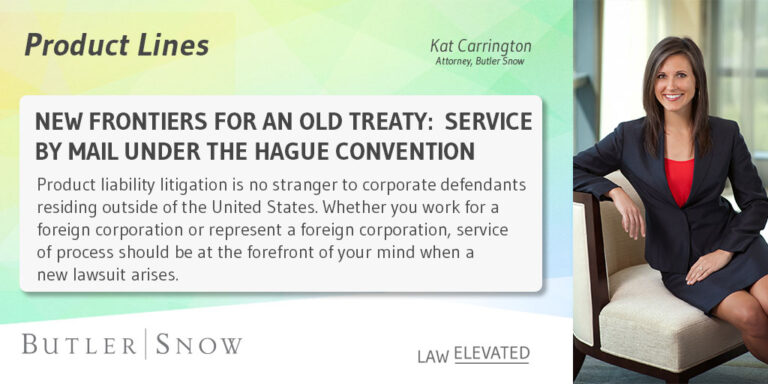Product liability litigation is no stranger to corporate defendants residing outside of the United States. Whether you work for a foreign corporation or represent a foreign corporation, service of process should be at the forefront of your mind when a new lawsuit arises. Such service is often governed by the Convention on the Service Abroad of Judicial and Extrajudicial Documents in Civil or Commercial Matters, more commonly referred to as the Hague Convention. See 20 U.S.T. 361 (Feb. 10, 1969). The Hague Convention is a multilateral treaty intended to facilitate service of process to ensure foreign defendants receive actual, timely notice of lawsuits filed against them. A working knowledge of permissible service under the Hague Convention can make all the difference for you or your client, as a successful challenge to service can result in the dismissal of a case in its entirety.
As most would say, easier said than done. The Hague Convention is complex, and understanding its nuances can be a challenge. As much of a challenge as it is for the defense, it is arguably even more of a challenge for plaintiffs’ attorneys who have to ensure they are in compliance when serving process. Defense lawyers frequently use this to their benefit, reaching agreements with plaintiff’s attorneys to waive service under the Hague Convention in exchange for other benefits in the forthcoming litigation such as additional time to respond to discovery.
In the past year, the United States Supreme Court has – to an extent – evened the playing field. In a decision resolving a circuit split, the Supreme Court in Water Splash, Inc. v. Menon, 137 S. Ct. 1504 (May 22, 2017), found the Hague Convention permits service by mail.
Water Splash, Inc., a corporation producing aquatic playground systems, filed suit against former employee Menon for allegedly working for a competitor during her employment with Water Splash. At the time of filing suit, Menon resided in Canada. Water Splash obtained permission from Canada to serve Menon by mail. Menon did not answer or appear, and the court entered a default judgment against Menon. Menon unsuccessfully moved to set aside the default judgment, arguing that service by mail is not permissible under the Hague Convention. The Supreme Court granted certiorari to resolve what it saw as a broader conflict among courts as to whether the Hague Convention allows service by mail.
In finding it permissible to serve a foreign litigant by mail, the Court clarified that it is not always permissible:
[T]he traditional tools of treaty interpretation unmistakably demonstrate that Article 10(a) encompasses service by mail. To be clear, this does not mean that the Convention affirmatively authorizes service by mail. Article 10(a) simply provides that, as long as the receiving state does not object, the Convention does not “interfere with . . . the freedom” to serve documents through postal channels.
137 S. Ct. at 1513 (emphasis in original). The Supreme Court set forth a two-part bright line rule for litigants to follow in assessing whether service by mail is permissible in their cases:
[I]n cases governed by the Hague Service Convention, service by mail is permissible if two conditions are met: first, the receiving state has not objected to service by mail; and second, service by mail is authorized under otherwise-applicable law.
Id.
Case law following Water Splash has shown that litigants must demonstrate compliance with both prongs of the two-part test before courts will deem service by mail proper. In Moore v. Toyota Motor Corporation, 2017 WL 5257050 (E.D. La. Nov. 13, 2017), for example, the plaintiff attempted to serve defendant Toyota, a Japanese corporation, through the U.S. Postal Service. Although Japan is a signatory to the Hague Convention, the plaintiff did not demonstrate that Japan would allow service by mail, and the plaintiff did not otherwise “attempt service through Japan’s central authority or any other internationally agreed means,” i.e. the plaintiff did not satisfy the first part of the two-part test. Id. at *2. The court further found that Fed. R. Civ. P. 4(f) does not authorize service “by regular international mail,” and instead only allows service by mail “if directed by the district court, or if notice is sent by the clerk of court through a form of mail that requires a signed receipt,” i.e. the plaintiff did not satisfy the second part of the two-part test. Id. (citing Brockmeyer v. May, 383 F.3d 798, 804-05 (9th Cir. 2004)). Accordingly, the court ordered the case would be dismissed if the plaintiff did not properly serve Toyota within 60 days. See id.
Likewise, in Federal Insurance Company v. Cessna Aircraft Co., 2017 WL 2905576 (D. Kan. July 7, 2017), the plaintiff moved for a default judgment against defendant TAT Technologies after plaintiff attempted service “by international mail with evidence of delivery at [defendant’s] business address in Israel,” and TAT neither answered nor appeared in the case Id. at *1. As to the propriety of service, the court denied plaintiff’s motion because (1) the plaintiff did not show Israel permits service by mail and (2) the plaintiff did not show compliance with Fed. R. Civ. P. 4(f)(2), i.e. the plaintiff did not satisfy either prong of the two-part test. Id. at *2-3.
As Water Splash and the cases following it make clear, service by mail is not automatically allowed under the Hague Convention. Understanding the ins and outs of available service of process by mail on defendants outside of the United States will only serve to benefit you and your client, whether the benefit arises in early negotiations with the other side, ensuring the foreign defendant timely appears following proper service, or in effectively challenging a plaintiff’s attempt at service by mail. Take the time to understand the rules of the foreign jurisdiction you are working with and use them to your advantage in future litigation.
